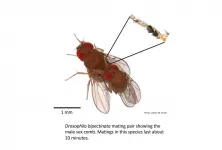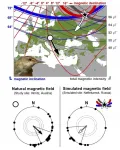INFORMATION:
Study contradicts belief that whales learn songs from one another
New study calls into question widely held beliefs of imitation and cultural transmission among humpbacks. The provocative findings will probably make other whale researchers livid or dismissive, says UB researcher
2021-02-12
(Press-News.org) BUFFALO, N.Y. - Humpback and bowhead whales are the only mammals other than humans thought to progressively change the songs they sing through a process of cultural learning.
But maybe the humpbacks are no longer part of that trio. Humpbacks might be singing songs that are not as "cultured" as once assumed.
A new study by a University at Buffalo researcher is directly contradicting the widely accepted cultural transmission hypothesis suggesting that whales learn their songs from other whales.
"It seems like that is not correct," says Eduardo Mercado, a professor of psychology in UB's College of Arts and Sciences. "Our findings indicate that neither cultural transmission nor social learning contributes significantly to how humpback whales change their songs over time.
"I think the results are provocative and will probably make other whale researchers livid or dismissive, but at least the discussion won't be boring!"
The study, published Tuesday (Feb. 9) in the Journal of Comparative Psychology, analyzed songs from groups of humpbacks that were not in acoustic contact with each other, yet still produced acoustically comparable songs.
"The idea that humpback whales are a distinguished part of the animal kingdom because of their ability to culturally learn songs is apparently not true," says Mercado. "But to me, what the whales are doing is actually more impressive.
"Cultural transmission implies that what's heard is copied. That means it doesn't matter what is heard or what is copied. But what we found is very specific and precise, without a trace of arbitrary vocalization. The songs change over time in a fashion that's even more precise than what humans do when language develops."
The talented club DJ serves as an appropriate metaphor for changing whale song.
"DJs can't just randomly go from one song to the next," says Mercado. "They have to think about beat matching, tempo and mood in order to maintain a continuous flow.
"I think that might be true of the whales. When they make changes, they do so in relation to what preceded it. They're basically beat matching when they change songs - and we found similarities in populations that had no social contact or genetic links."
Mercado says existing research claims that humpback populations isolated from one another do not change their songs in the same way. Each population is original, taking their songs in original directions.
"These things are not true," says Mercado. "I compare songs over 40 years and compare populations that have never been in contact with one another, and they're doing basically the same thing."
Despite large and sometimes rapid changes, whales often end up singing similar songs, according to Mercado. The cultural transmission hypothesis is attractive in part because it's hard to imagine what mechanism might instigate the song variation.
But previous research has relied heavily on subjectively defined categories. Songs sounding like a human snore would be placed in a "snore" category. Any subsequent analysis would depend on how well the categories captured the intricacies of the song.
"I didn't categorize things at all and used purely acoustic measurements," says Mercado, who specifically chose published records of data to avoid any suggestion of cherry picking the data. "This paper is based on direct measurements of sound features without any categorization or subjective labeling."
Mercado says the results of the current study question the role of vocal imitation and cultural transmission in humpback whale song, but they do not resolve why the songs are changing.
"These results tell me that whales are sophisticated in ways that researchers and observers hadn't previously considered," says Mercado. "What we're hearing is a level of acoustic sophistication which is beyond the ability of humans.
"That's something that deserves both appreciation and further study. I'd like to examine why whale song changes and explore the benefit of that change."
ELSE PRESS RELEASES FROM THIS DATE:
'Sex, lasers and male competition:' fruit flies win genetic race with rivals
2021-02-12
Scientists have accepted natural selection as a driver of evolution for more than 160 years, thanks to Charles Darwin.
But University of Cincinnati biologist Michal Polak says Darwin's book "The Descent of Man" only tells part of the story. Sometimes when the victor vanquishes his sexual rival, the quest to pass genes to the next generation is just beginning.
According to a new UC study published in the journal Current Biology, male fruit flies with the most impressive sexual ornamentation also have super sperm that can outcompete that of rivals in the post-mating fertilization game.
UC studied Drosophila bipectinata, a tiny red-eyed fruit fly ...
The effects of antidepressant drugs evaluated through the analysis of patients' tweet
2021-02-12
Researchers of the Research Programme on Biomedical Informatics (GRIB) from UPF and Hospital del Mar Medical Research Institute (IMIM) in Barcelona, Spain, have identified behavioural and linguistic changes in tweets in Spanish published by users suffering from depression and who are taking medication to treat this disease.
Their work has been published in Journal of Medical Internet Research and was led by Ferran Sanz; with Angela Leis and Francesco Ronzano as first authors, who conducted the work together with Miguel Angel Mayer and Laura I Furlong, all from the Integrative Biomedical Informatics research ...
Scientists manipulate magnets at the atomic scale
2021-02-12
Fast and energy-efficient future data processing technologies are on the horizon after an international team of scientists successfully manipulated magnets at the atomic level.
Physicist Dr Rostislav Mikhaylovskiy from Lancaster University said: "With stalling efficiency trends of current technology, new scientific approaches are especially valuable. Our discovery of the atomically-driven ultrafast control of magnetism opens broad avenues for fast and energy-efficient future data processing technologies essential to keep up with our data hunger."
Magnetic materials are heavily used in modern life with applications ranging from fridge magnets to Google and Amazon's ...
Birds can 'read' the Earth's magnetic signature well enough to get back on course
2021-02-12
Birdwatchers get very excited when a 'rare' migratory bird makes landfall having been blown off-course and flown beyond its normal range. But these are rare for a reason; most birds that have made the journey before are able to correct for large displacements and find their final destination.
Now, new research by an international team shows for the first time, how birds displaced in this way are able to navigate back to their migratory route and gives us an insight into how they accomplish this feat.
Writing in Current Biology, the team from Bangor and Keele Universities describe how reed warblers can navigate from a 'magnetic position' beyond what they have ...
Effect of high-dose zinc, ascorbic acid supplementation vs usual care on symptom length, reduction among ambulatory patients with SARS-CoV-2 infection
2021-02-12
What The Study Did: These findings suggest that treatment with zinc, ascorbic acid or both doesn't affect SARS-CoV-2 symptoms.
Authors: Milind Y. Desai, M.D., M.B.A., of the Cleveland Clinic in Ohio, is the corresponding author.
To access the embargoed study: Visit our For The Media website at this link https://media.jamanetwork.com/
(doi:10.1001/jamanetworkopen.2021.0369)
Editor's Note: The article includes conflict of interest disclosures. Please see the article for additional information, including other authors, author contributions and affiliations, conflict of interest and financial disclosures, and funding and support.
INFORMATION:
Media advisory: The full study is linked to ...
Pediatric hospital admissions in 2020 compared with decade before COVID-19
2021-02-12
What The Study Did: Pediatric admissions to U.S. hospitals decreased last year across an array of pediatric conditions and some may represent unmet needs in pediatric care during the COVID-19 pandemic.
Authors: Christopher M. Horvat, M.D., M.H.A., of UPMC Children's Hospital of Pittsburgh, is the corresponding author.
To access the embargoed study: Visit our For The Media website at this link https://media.jamanetwork.com/
(doi:10.1001/jamanetworkopen.2020.37227)
Editor's Note: The article includes conflict of interest and funding/support disclosures. Please see the article for additional information, including other authors, author contributions and affiliations, conflict of interest and financial disclosures, and funding and support.
INFORMATION:
Media advisory: ...
Variations in sensitivity of serological tests among individuals infected with SARS-CoV-2
2021-02-12
What The Study Did: This observational study investigated the sensitivity of antibody tests to detect previous SARS-CoV-2 infection using existing clinical data across the University of California Health system.
Authors: Atul J. Butte, M.D. Ph.D., of the University of California, San Francisco, is the corresponding author.
To access the embargoed study: Visit our For The Media website at this link https://media.jamanetwork.com/
(doi:10.1001/jamanetworkopen.2021.0337)
Editor's Note: The article includes conflict of interest and funding/support disclosures. Please ...
Green tea compound aids tumor-suppressing, DNA-repairing protein
2021-02-12
TROY, N.Y. -- An antioxidant found in green tea may increase levels of p53, a natural anti-cancer protein, known as the "guardian of the genome" for its ability to repair DNA damage or destroy cancerous cells. Published today in END ...
Assessing brain capillaries in COVID-19
2021-02-12
What The Study Did: This case series analyzes brains from autopsies of patients who died of COVID-19 as confirmed by nucleic acid test and with severe pulmonary pathology.
Authors: David W. Nauen, M.D., Ph.D., of Johns Hopkins University in Baltimore, is the corresponding author.
To access the embargoed study: Visit our For The Media website at this link https://media.jamanetwork.com/
(doi:10.1001/jamaneurol.2020.0225)
Editor's Note: The article includes conflicts of interest disclosures. Please see the article for additional information, including other authors, author contributions and affiliations, ...
Study explores neurocognitive basis of bias against people who look different
2021-02-12
PHILADELPHIA--The "scarred villain" is one of the oldest tropes in film and literature, from Scar in "The Lion King" to Star Wars' Darth Vader and the Joker in "The Dark Knight." The trope is likely rooted in a long-evolved human bias against facial anomalies -- atypical features such as growths, swelling, facial paralysis, and scars. A new brain-and-behavior study from researchers in the Perelman School of Medicine at the University of Pennsylvania illuminates this bias on multiple levels.
The researchers, whose findings were published this week in the Annals of the New York Academy of Sciences, used surveys, social simulations, and functional MRI (fMRI) studies to study hundreds of participants' responses and attitudes towards ...
LAST 30 PRESS RELEASES:
Does mental health affect mortality risk in adults with cancer?
EANM launches new award to accelerate alpha radioligand therapy research
Globe-trotting ancient ‘sea-salamander’ fossils rediscovered from Australia’s dawn of the Age of Dinosaurs
Roadmap for Europe’s biodiversity monitoring system
Novel camel antimicrobial peptides show promise against drug-resistant bacteria
Scientists discover why we know when to stop scratching an itch
A hidden reason inner ear cells die – and what it means for preventing hearing loss
Researchers discover how tuberculosis bacteria use a “stealth” mechanism to evade the immune system
New microscopy technique lets scientists see cells in unprecedented detail and color
Sometimes less is more: Scientists rethink how to pack medicine into tiny delivery capsules
Scientists build low-cost microscope to study living cells in zero gravity
The Biophysical Journal names Denis V. Titov the 2025 Paper of the Year-Early Career Investigator awardee
Scientists show how your body senses cold—and why menthol feels cool
Scientists deliver new molecule for getting DNA into cells
Study reveals insights about brain regions linked to OCD, informing potential treatments
Does ocean saltiness influence El Niño?
2026 Young Investigators: ONR celebrates new talent tackling warfighter challenges
Genetics help explain who gets the ‘telltale tingle’ from music, art and literature
Many Americans misunderstand medical aid in dying laws
Researchers publish landmark infectious disease study in ‘Science’
New NSF award supports innovative role-playing game approach to strengthening research security in academia
Kumar named to ACMA Emerging Leaders Program for 2026
AI language models could transform aquatic environmental risk assessment
New isotope tools reveal hidden pathways reshaping the global nitrogen cycle
Study reveals how antibiotic structure controls removal from water using biochar
Why chronic pain lasts longer in women: Immune cells offer clues
Toxic exposure creates epigenetic disease risk over 20 generations
More time spent on social media linked to steroid use intentions among boys and men
New study suggests a “kick it while it’s down” approach to cancer treatment could improve cure rates
Milken Institute, Ann Theodore Foundation launch new grant to support clinical trial for potential sarcoidosis treatment
[Press-News.org] Study contradicts belief that whales learn songs from one anotherNew study calls into question widely held beliefs of imitation and cultural transmission among humpbacks. The provocative findings will probably make other whale researchers livid or dismissive, says UB researcher




